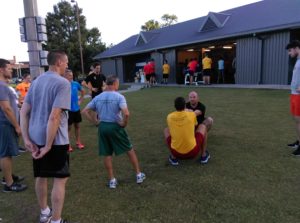Main Menu
Latest Blog Entry
User login
Sports Science for sports coaches
Sports Science for coaches
Last month I attended Vern Gambetta’s GAIN conference in Houston, Texas. A great mix of practical sessions, seminars and informal idea sharing, it is my annual chance to take time out and immerse myself in learning.
I shall be sharing some of the ideas and insights learnt this year. The act reviewing what happened and disseminating that into a hopefully useful blog post is part of my ongoing learning.
Today I start with Peter Weyand’s second seminar which was a great overview of the scientific process and how things stand in this millennium.
Sorting Sport Science in the Digital Era
In the last millennium there was little or no information available to sports coaches. Peter said that much or most of what is available now is “shaky”.
Here are his 5 “Drivers of Disinformation”:
- Proliferation of Information Outlets (Instagram, Facebook, YouTube, Podcasts and Twitter).
- Volume of data and literature being produced (wearables and new technology).
- Poor quality research training.
- Pressure to publish (anything).
- Self-Promotion (Not all bad, helps share ideas, but often results in self-citations).
This results in “literature pollution” and disinformation. Peter said that “laziness is the default intellectual condition”.
It is hard to filter what is good or useful in this age. In fact, “Computers don’t reduce work, they create more of it” (Peter Taylor, 1994).
So how can busy sports coaches develop a filter and understand what will work best for their teams and athletes?
The Scientific Method
Two years ago I was asked to present a CPD event to physiotherapists in Exeter. I gave my thoughts and observations on using motor skills learning in rehabilitation so that patients are working towards useful (and interesting) outcomes. At the end, one physio asked “Yes, but what about the science?”
“The science”? As if there is one thing that is all encompassing, this from a person with a science based degree showed a lack of understanding of the scientific process. Many coaches have no formal scientific background, but can still follow the scientific method.
Peter laid it out very well, and these principles will help you as a coach develop a filter.
- Get an idea or question.
- Make observations.
- Analyse observations.
- Idea supported: Yes/No?
Peter suggested that good researchers ask good questions and then look to first principles for answers.
Step 1: The research question must be good.
Step 2: The hypothesis must be testable. The design of the study must yield data that will “get out of the noise”.
Step 3: Analyse the observations in the right way. Peter used several examples to illustrate what works/ doesn’t work.
Step 4: Proving and disproving: how well does data support the idea?
An interesting point was that an idea can never be proven true! Instead, the scientific method can only disprove. It only takes one outlier or piece of data to disprove a theory: the exception.
For example, Peter was studying sprinters in action and a common hypothesis was that symmetry between limbs was needed. One sprinter had a big asymmetry and yet was very fast. This one individual therefore disproved the symmetry hypothesis. Other factors must be important in sprinting.
Degrees of Uncertainty
In the past I have often got confused about what is presented as “research” compared to “theories”. This is especially true in ideas like Long Term Athlete Development (LTAD), where many papers are published stating that this latest version is the definitive answer.
Peter helped me understand better the hierarchical language of degrees of certainty.
1: Hypothesis (an idea).
2: Model (LTAD is an example).
3: Mechanism.
4: Law (Gravity). Hard to argue with this.
(Peter may yet to have dealt with “Mum Chat” or “Bloke down the pub” which trumps all of the above! No matter what I do to try and help educate parents, they prefer to listen to their friends).
Conclusions
This presentation really helped me understand the scientific method (much more so than a whole module of “research methods” at Brunel University whilst studying for my MSc).
“If you cannot explain the conclusion in 1-2 sentences, you will never reach a general audience”. I would add that if you cannot explain the conclusion succinctly, you may be unclear yourself as to what is happening.
Peter used Isaac Newton as an example of making a big subject very simple. Newton expressed his 3 laws in simple terms and then came up with a very simple equation F=Ma.
When doing research (that includes looking at your own teams) it is important to “Get the big stuff and keep moving” (so much for “marginal gains”). Find out what matters most and look at that.
When reading research “It’s critical to be critical”.
Check the scientific method of the paper:
1: Is the idea supported Yes/ No and does it have a value?
2: Is it testable?
This will then help you decide whether to try and implement some of the ideas into your own practice.
Peter’s whole talk was illustrated with examples of his research and that of his colleagues. I was impressed with the detail he goes into, how much work and effort is required and also how he explained it.
Brilliant.
Further Reading:
Client Testimonials
 University of Exeter
University of Exeter
James has been our lead strength and conditioning coach for the Talented Athlete Scholarship Scheme (TASS) at the University of Exeter since the scheme's inception. His attitude, professionalism and above all his drive and desire to help each sportsman and woman develop and reach their potential is exactly what we require. James shows a real interest in each of his athletes and helps them to aspire to be as good as they can and ensures that no goals are unattainable.
More




Comments
A very useful seminar, great to look back at it after a year and then refine my coaching.